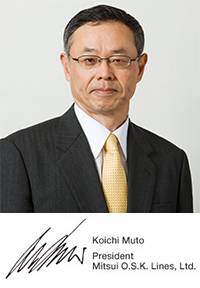MOL President Calls for Focused Growth in 2014
MOL Group president Koichi Muto issued a New Year message that reflects on 2013 while rallying for company-wide growth in 2014 as MOL prepares for 130th anniversary.
“Looking back at 2013, Japan’s economy finally started to offer a glimpse of hope for pulling out of the deflation from which it has suffered for many years,” Muto said. “This can be attributed to the economic policies of Prime Minister Abe’s government, or the so-called “three arrows” of Abenomics. Last year, MOL put itself back on track to restore profitability by releasing two arrows of its own: Business Structure Reforms (BSR) and cost reductions at an entirely different stage than before. This year, MOL’s growth strategy—the third arrow, so to speak—will be put to the test. Today I will talk mainly about MOL’s business environment and key points to keep in mind as we strive to put MOL on a new growth trajectory.”
Muto continued, “In 2013, while some emerging economies showed signs of a slower pace of growth, the global economy recovered on the whole, centered on developed countries, and we saw steady growth in seaborne trade volume. As the supply of new vessels declined, the supply-demand gap for vessels gradually started to improve. However, given that excess shipbuilding capacity remains, even if freight rates rise in the next few years, the increase could be subdued. Moreover, last year large numbers of vessels were again ordered by speculative investors. Furthermore, we will need to keep a close eye on risk factors. Possible examples include seaborne trade volume to China peaking out in the future, and a reduction in ton-miles driven by the shift to local production, local consumption, as exemplified by completed vehicles.
“Furthermore, MOL is facing major upheaval in the business environment, including shorter contract periods, the shift of customers to Asia, and the entry of new players. Other developments include burgeoning growth in market-linked contracts and changing trade patterns. One of the MOL Group Corporate Principles is as follows: as a multimodal transport group, we will actively seize opportunities that contribute to global economic growth and development by meeting and responding to our customers’ needs and to this new era. In response to changes in customer needs, we are required to drive the MOL Group’s sustained growth by steadily addressing demand for marine transport while pooling the Group’s wisdom and taking creative initiatives.
“In September 2012, the Japan Fair Trade Commission conducted an on-site inspection of MOL based on cartel-related allegations in connection with car carriers. MOL has fully cooperated with the authorities’ investigation. We are conducting a full follow-up investigation of our business conduct with the aim of ensuring even more transparent management and business operations. Legal compliance is an absolute precondition for corporate business activities. Therefore, we will continue to bolster global compliance going forward. Furthermore, in June 2013, an MOL-operated containership suffered a major marine accident, which has greatly inconvenienced many of our customers. An MOL-operated LNG carrier and a dry bulker were also involved in marine accidents. Sweeping safe-operation initiatives to eradicate such major marine accidents are an urgent priority. Meanwhile, MOL’s financial position deteriorated unavoidably in the course of executing BSR from January to March last year. Strengthening our financial trustworthiness to enable investment in growth fields is essential for drawing up a growth strategy.
“The management of the MOL Group’s business operations is premised significantly on the trust of stakeholders. To restore this trust, MOL will make a company-wide effort to address the aforementioned priorities.
“The key priority for MOL in 2014 will be to define the key points of its growth strategy - the third arrow -and to execute it. With no immediate prospects for any appreciable increase in market prices in the marine transport industry, MOL must be mindful of the added value it can generate and the services it can sell. We must focus on sharpening our skills in those areas. In the LNG carrier and offshore businesses, – growing fields that are expected to generate stable profits over the long term – we will invest management resources to expand these businesses. In response to diversifying needs for marine transport and transport coordination, MOL needs to further refine the maritime technical know-how and ship operation techniques it has amassed to date. MOL must become the customer’s preferred shipping company by virtue of its technical capabilities. In other divisions, MOL must graduate from reliance on market conditions, and set itself apart from other companies by providing customers with more sophisticated added value. In doing so, we should build up stable profits by concluding long-term contracts with customers. It is also essential to identify business opportunities in new fields. We should pursue new business opportunities based on a proper understanding of new trends and market needs. Examples include the emergence of a host of new transport opportunities following the Shale Revolution and developments surrounding environmental regulations related to ships, not to mention operations peripheral to marine transport, such as terminal operations.”














